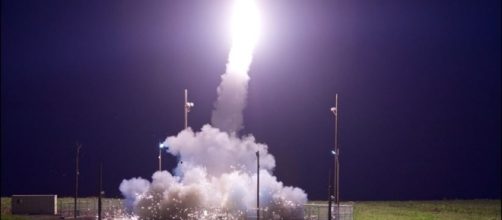On Tuesday morning, North Korea’s Ballistic Missile crossed over Hokkaido, sparking tensions in Japan. Radio stations and television channels across Japan broadcasted the “J-Alert” to the residents, asking them to take cover and to take other precautions. Recognizing North Korea’s act as an unprecedented, serious, and grave threat, Prime Minister Shinzo Abe emphasized that he will do everything in his power to ensure public safety. Other world leaders strongly condemned North Korea and pledged their support to Japan.
World leaders stand united in response to North Korea's activity
Supposedly a part of a routine test, North Korea launched a new intermediate-range Hwasong-12 missile from an area close to the capital of Pyongyang, reaching an altitude of about 550 km. The country had earlier threatened to strike the sea area near Guam in the U.S. Pacific region with four of these intermediate-range missiles. This missile launch might have been a reaction to the annual military drills conducted by the joint forces of the U.S. and South Korea.
Many nations came forward and raised a red flag over this issue. President Trump assured that the United States was a 100% with Japan. In addition to the new sanctions imposed on North Korea, the United Nations Security Council members have agreed to meet once again to discuss new measures that could resolve the situation.
South Korea also countered the North Korean missile launch by deploying fighter jets to bomb a military firing range. South Korea and the United States further discussed possibilities of positioning strategic assets in the Korean peninsula to further step up the pressure on North Korea. The Australian Prime Minister Malcolm Turnbull suggested that China has a unique leverage over North Korea, and so it needs to do more than just condemning the missile launch.
Implications of North Korea’s defiance to end its nuclear weapons program
Global markets negatively reacted to this missile launch by selling off stocks and buying safe assets like gold, Swiss franc, and the Japanese yen. Japan’s Nikkei 225 Index dropped to a four-month low with a 1% fall, and South Korea’s KOSPI Index dropped too.
Rex Tillerson, the U.S Secretary of State, had praised Pyongyang for restraining itself from performing such tests since early July. However, the missile launch on Tuesday morning may be seen as a hindrance to peace talks. Experts also say that Kim Jong-Un may have used the missile launch today to show the country’s capacity as a way to open dialogue.
Though the Japanese and South Korean defense strategies are equipped to tackle missiles, missiles flying at such heights are difficult to defend against. In such a situation, North Korea’s continued defiance is bound to upset further peace talks.


